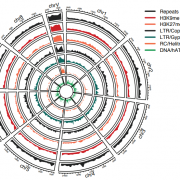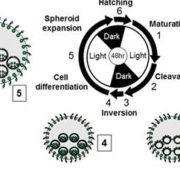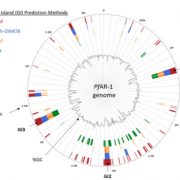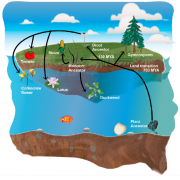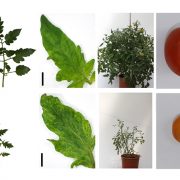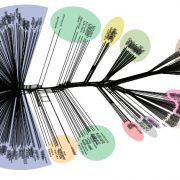Evolution of the thermostability of actin-depolymerizing factors enhances pollen germination at high temperature
 In angiosperms, pollen germination leads to a period of extensive polarized growth of the pollen tube, which carries the sperm nuclei to the ovule. Studies of tip growth in both pollen tubes and root hairs have contributed to a descriptive model that involves polarized vesicle movement along the cytoskeleton to release materials needed for growth, such as cell wall precursors, at the growing tip. Key to this is the rapid disassembly and reassembly of the actin filaments due to the action of numerous actin-binding proteins, including actin-depolymerizing factors (ADFs). Here, Qian et al. investigated the ADF protein family in plants. In Arabidopsis, ADF proteins expressed highly in pollen display remarkable thermal stability, remaining undenatured even after boiling, whereas other ADFs denature at much lower temperatures. Genetic studies revealed that the thermostable ADFs are needed for pollen germination at the high temperatures that can occur in summertime, e.g., 37 degrees. The authors identified a few key residues as critical for thermostability. They then examined ADF proteins across the plant lineage and identified sequences of ancestral proteins; their results showed a trend of increasing and decreasing thermostability over evolutionary time. Interestingly, the trend maps to the changing global temperature over the past few hundred million years, and the emergence of the pollen-specific thermostable forms coincide with the rise of angiosperms. (Summary by Mary Williams @PlantTeaching) Plant Cell 10.1093/plcell/koad280
In angiosperms, pollen germination leads to a period of extensive polarized growth of the pollen tube, which carries the sperm nuclei to the ovule. Studies of tip growth in both pollen tubes and root hairs have contributed to a descriptive model that involves polarized vesicle movement along the cytoskeleton to release materials needed for growth, such as cell wall precursors, at the growing tip. Key to this is the rapid disassembly and reassembly of the actin filaments due to the action of numerous actin-binding proteins, including actin-depolymerizing factors (ADFs). Here, Qian et al. investigated the ADF protein family in plants. In Arabidopsis, ADF proteins expressed highly in pollen display remarkable thermal stability, remaining undenatured even after boiling, whereas other ADFs denature at much lower temperatures. Genetic studies revealed that the thermostable ADFs are needed for pollen germination at the high temperatures that can occur in summertime, e.g., 37 degrees. The authors identified a few key residues as critical for thermostability. They then examined ADF proteins across the plant lineage and identified sequences of ancestral proteins; their results showed a trend of increasing and decreasing thermostability over evolutionary time. Interestingly, the trend maps to the changing global temperature over the past few hundred million years, and the emergence of the pollen-specific thermostable forms coincide with the rise of angiosperms. (Summary by Mary Williams @PlantTeaching) Plant Cell 10.1093/plcell/koad280


